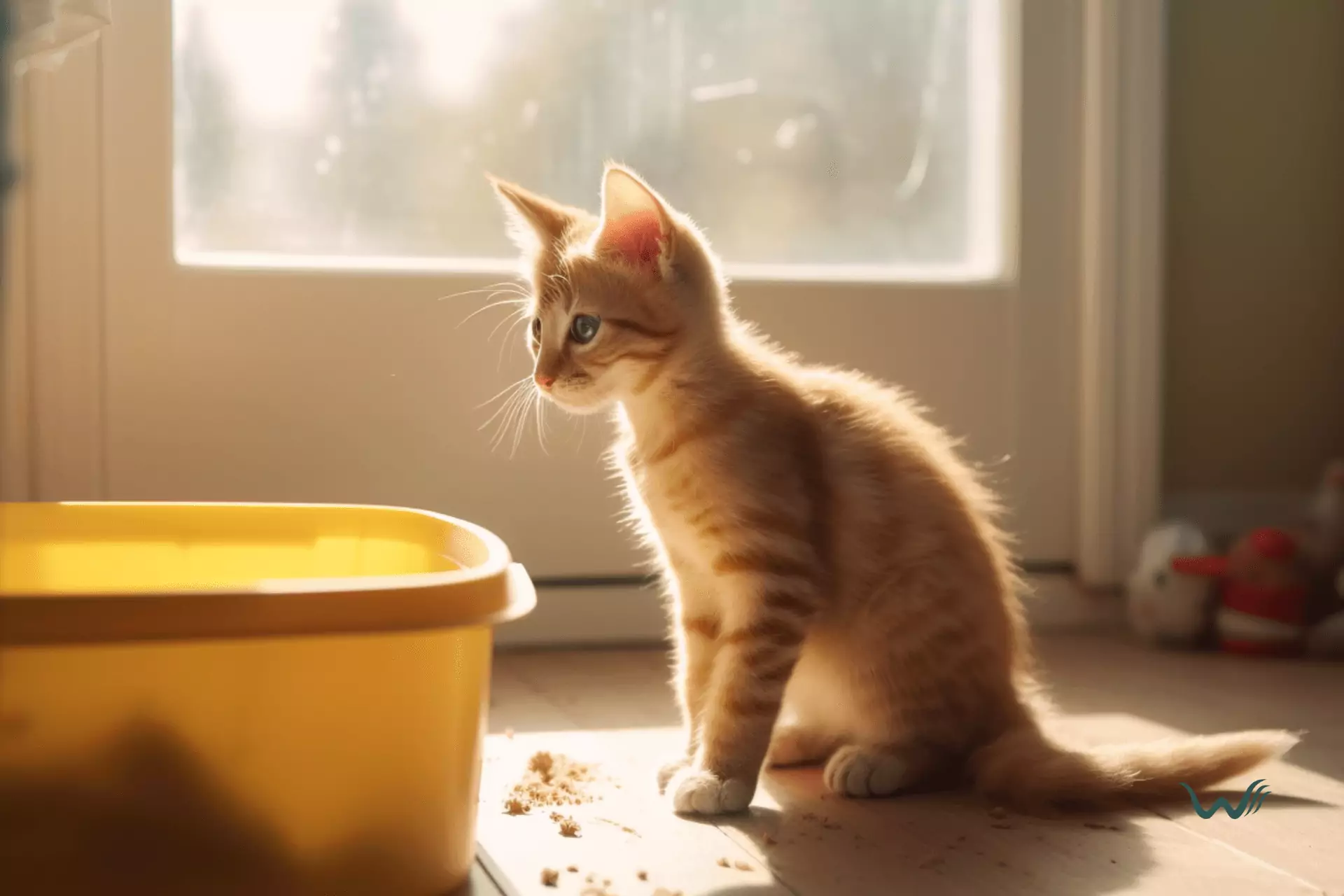

How To Stop A Kitten From Eating Litter
by Haley Mills
Last updated: April 23, 2024
Verified and Approved by:
Angela Morris,
MSW, LCSW
Fact Checked

Are you struggling with a kitten that just can’t seem to resist the temptation of eating litter? This behavior can be frustrating and concerning, but the good news is that there are steps you can take to address it.
In this article, we will explore the reasons behind this behavior, as well as provide you with practical tips and strategies to help you stop your kitten from eating litter. By identifying these reasons, you can better address the underlying causes and take appropriate action to discourage your kitten from eating litter.
Key Takeaways
- Consult a veterinarian to address nutritional deficiencies and reduce stress.
- Place the litter box properly and choose a safe type to prevent litter-eating behavior.
- Provide alternative chewing options, such as toys and interactive feeding methods, to redirect the kitten’s attention.
- Teach proper eating habits through positive reinforcement and a consistent feeding schedule to discourage litter consumption.
Understanding the Reasons Behind the Behavior
One possible explanation is nutritional deficiencies. Kittens have specific dietary needs, and if they’re not getting the proper nutrients, they may try to supplement their diet by eating non-food items like litter. Ensure your kitten is on a balanced and appropriate diet to prevent this behavior.
Another possible reason for a kitten eating litter is stress and anxiety. Just like humans, kittens can experience stress and anxiety, and they may exhibit this behavior as a way to cope. Changes in their environment, such as moving to a new home or introducing a new pet, can be stressful for kittens. Additionally, if they’re not receiving enough mental and physical stimulation, they may resort to eating litter as a form of entertainment or to alleviate boredom.
To address the issue, it’s crucial to consult with a veterinarian. They can help determine if any nutritional deficiencies need to be addressed and provide guidance on appropriate diet options. Additionally, they can offer advice on how to reduce stress and anxiety in your kitten’s life. This may include providing a comfortable and secure environment, offering plenty of playtime and exercise, and considering the use of calming aids, such as pheromone diffusers or supplements.
Identifying the Right Litter Box and Litter Type
Choosing the correct litter box and litter type can help prevent unwanted behavior in your kitten. When it comes to litter box placement, it’s essential to consider the accessibility and privacy of your kitten. Place the litter box in a quiet and easily accessible area of your home, away from high foot traffic or loud noises. This will help your kitten feel more comfortable and secure using the litter box. Additionally, make sure the litter box is placed in an area where your kitten can easily find it, especially if they’re still in the process of being litter box trained.
In addition to proper litter box placement, the type of litter you choose can also prevent your kitten from eating litter. It’s recommended to use a litter that’s safe and non-toxic for your kitten. Avoid using clumping litter, as it can be harmful if ingested. Instead, opt for a non-clumping litter made from natural materials such as paper, wood, or corn. These types of litter are less likely to be harmful if your kitten accidentally consumes them. By selecting the right litter box and litter type, you can create a positive environment for your kitten to use the litter box and reduce the likelihood of them eating litter.
Providing Alternative Chewing Options
Providing alternative options for chewing can help deter a kitten from consuming litter. Kittens often chew on litter out of curiosity or boredom, so offering them other objects to chew on can redirect their attention away from the litter box.
Here are some options to consider:
- Distracting toys: Provide your kitten with a variety of toys that are specifically designed for chewing. Look for toys made of safe materials, such as rubber or fabric, that can withstand a kitten’s sharp teeth. Interactive toys, such as puzzle toys or treat-dispensing toys, can also keep your kitten engaged and mentally stimulated, reducing their desire to chew on litter.
- Interactive feeding methods: Another way to distract your kitten from chewing on litter is by incorporating interactive feeding methods into their routine. Instead of simply placing food in a bowl, consider using puzzle feeders or food-dispensing toys that require your kitten to work for their food. This provides mental stimulation and helps satisfy their natural instinct to hunt and forage for food, reducing their urge to chew on litter.
- Bitter deterrent sprays: If your kitten continues to show interest in chewing on litter despite providing alternative options, you can try using a bitter deterrent spray. These sprays have a bitter taste that most kittens find unpleasant, discouraging them from chewing on the sprayed objects. Before using any deterrent spray, ensure it’s safe for kittens and follow the instructions carefully.
Teaching Proper Eating Habits
Teaching your kitten proper eating habits can help prevent them from consuming litter. One effective way to teach them is through positive reinforcement. When your kitten eats their food from their designated bowl, praise them and give them a small treat. This positive reinforcement will help them associate eating from their bowl with rewards and encourage them to continue this behavior.
Another aspect of teaching proper eating habits is establishing a consistent feeding schedule. Kittens thrive on routine; setting meal times can help them develop a healthy eating pattern. Feed your kitten at the same times every day and avoid leaving food out constantly. This will prevent them from grazing and potentially seeking out other substances, such as litter, to satisfy their hunger.
By providing regular and balanced meals, you can help ensure that your kitten gets the nutrition they need and reduce the likelihood of them eating litter. Teaching your kitten proper eating habits is crucial in preventing them from consuming litter. By using positive reinforcement and establishing a consistent feeding schedule, you can guide your kitten towards healthy eating behaviors and discourage them from seeking out litter as an alternative.
Can The Tips for A Purrfect Cat Adoption Help Stop My Kitten from Eating Litter?
Yes, following the cat adoption expert tips can definitely help in preventing your kitten from eating litter. By carefully selecting the right type of litter and providing appropriate toys and activities, you can ensure a smooth transition for your new feline friend and minimize the chances of litter ingestion.
Can changing a kitten’s diet from dry to wet food help prevent them from eating litter?
Switching your kitten’s diet from dry to wet food can help prevent them from eating litter. Increasing the wet food portion for cats can provide them with more moisture and nutrients, reducing their desire to consume non-food items like litter. Making this change may help keep your kitten healthier and safer.
Seeking Professional Advice and Support
Seeking professional advice and support can be beneficial when addressing a kitten’s litter-eating habit. Consulting a veterinarian for guidance is an excellent first step. Veterinarians have extensive knowledge and experience with cat behavior and can provide personalized advice tailored to your kitten’s specific needs. They can assess your kitten’s overall health and recommend any necessary dietary changes or supplements to address nutritional deficiencies contributing to the litter-eating behavior. Additionally, they can offer behavioral strategies and techniques to discourage the behavior and redirect your kitten’s attention to more appropriate activities.
Joining online forums for fellow cat owners’ experiences can provide valuable insights and support. Online forums allow you to connect with other cat owners who may have experienced similar issues with their kittens. They can offer practical tips and share their own success stories in overcoming litter-eating habits. These forums can also provide a sense of community and reassurance that you’re not alone in dealing with this behavior. By participating in these online discussions, you can gather a wealth of knowledge and advice to help you address the litter-eating habit effectively.
Frequently Asked Questions
Can a kitten’s litter-eating behavior be a sign of a health problem?
Yes, a kitten’s litter-eating behavior can be a sign of a health problem. It is essential to rule out medical issues such as nutritional deficiencies or gastrointestinal disorders before implementing behavioral training techniques for kittens.
How long does training a kitten to stop eating litter usually take?
Effective training methods for stopping litter eating behavior in kittens can take several weeks to months. Common challenges include persistence, consistency, and finding alternative distractions. Overcoming these challenges requires patience, positive reinforcement, and redirecting the kitten’s attention to appropriate toys and treats.
Are there any natural remedies or supplements that can help deter a kitten from eating litter?
Effective deterrents for litter eating kittens include using natural remedies such as citrus sprays or mixing cayenne pepper with the litter. Common reasons why kittens eat litter include nutritional deficiencies or boredom, which can be addressed through proper diet and providing stimulating toys.
Can a kitten’s litter-eating behavior be a result of anxiety or stress?
Possible causes of anxiety or stress in kittens include changes in environment, separation from mother or littermates, or traumatic experiences. Strategies for reducing anxiety and stress in kittens include providing a safe and comfortable environment, socialization, and gentle handling.
Is it normal for a kitten to occasionally eat litter even after training?
It is not uncommon for a kitten to occasionally eat litter even after training. Common reasons for this behavior include curiosity, boredom, or a nutritional deficiency. Effective training techniques to prevent litter eating include providing a litter box with appropriate litter and distractions like interactive toys.
Certify Your Emotional Support Animal Today

Why You Can Rely on Us?
At Wellness Wag, we believe your pet deserves care rooted in both science and compassion. Each article is carefully researched, written in clear language for pet owners, and then reviewed by qualified professionals to ensure the information is evidence-based, current, and practical for real-life care. Our goal is to help you feel confident in making informed decisions about your pet’s health and well-being.
Reviewed by
Angela Morris, MSW, LCSW
Angela is a licensed clinical social worker with 20 years of experience in patient advocacy and community mental health. She has assisted numerous clients with ESA evaluations and brings a deep understanding of disability accommodations, ensuring that all information is accurate, supportive, and practical.

Written by :
Haley Mills
Last Updated :
April 23, 2024










